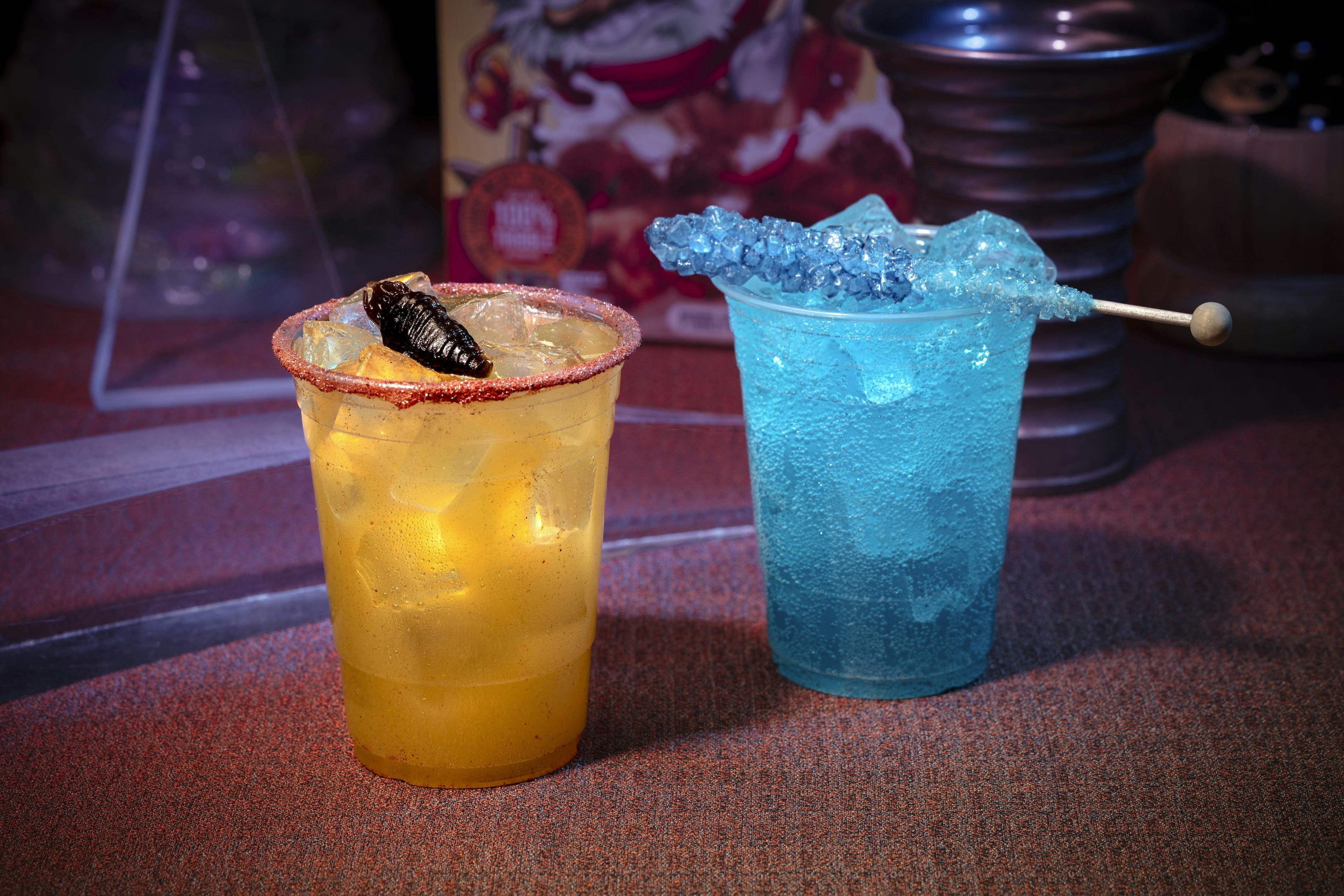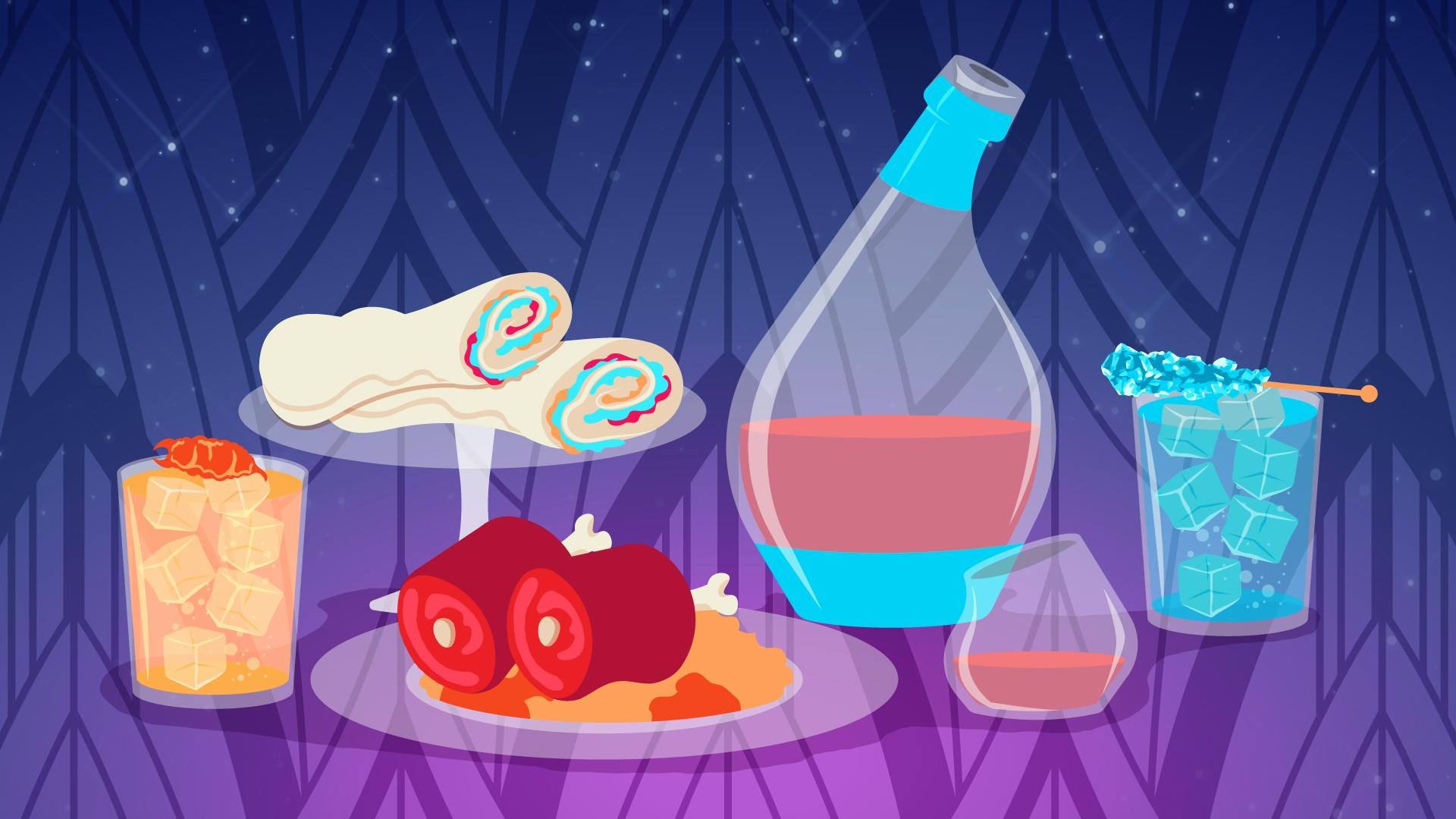Published Oct 16, 2023
Did Post-Scarcity Kill Earthlings' Culinary Traditions?
Let's look at why the culinary habits of 24th Century humans are stuck in the 20th.

StarTrek.com
Food has been the centerpiece of many scenes in Star Trek, but the franchise rarely examines the cultural impact of the simple (but essential) task of eating. The only impression we get for the most part, in the Federation at least, is that the views and traditions of food consumption are "normal."
There are some outliers, but Federation officers enjoy predominantly Western cuisine, with the rare "exotic" ethnic dish here and there, and see cooking as a hobby more than a necessity. But, is it really as simple as that?
We can assume that every world in the Federation has access to replicator technology. There are some agrarian worlds whose inhabitants seem to really enjoy roughing it, but even they probably have replicators for emergencies. So, in a post-scarcity society, why is the Federation so dull when it comes to eating? If you could beam almost any food into existence with just a few words exactly the way you want it, would you always be asking for, "Tea. Earl Grey. Hot."?

"Bloodlines"
StarTrek.com
Despite their alliance as of the end of , the Federation and Klingons are opposites in many ways, including in their culinary habits. While the Federation predominantly relies on replicator technology for its foodstuffs, Klingons tend to shun imitation cuisine. We hear several times throughout the franchise, particularly during the Dominion War, that Klingon ships carry live food like gagh and officers tended to bring their own casks of bloodwine onboard.
In the episode “,” Worf's brother had to be reminded that members of the Federation relied on replicators for their food. While this could be taken to mean that Klingons are unfamiliar with replicator technology, it seems impossible that an empire that's technologically equivalent to the Federation wouldn't have discovered or acquired it by the 2360s when The Next Generation takes place. Instead, it seems to speak of a significant cultural difference between the two powers.
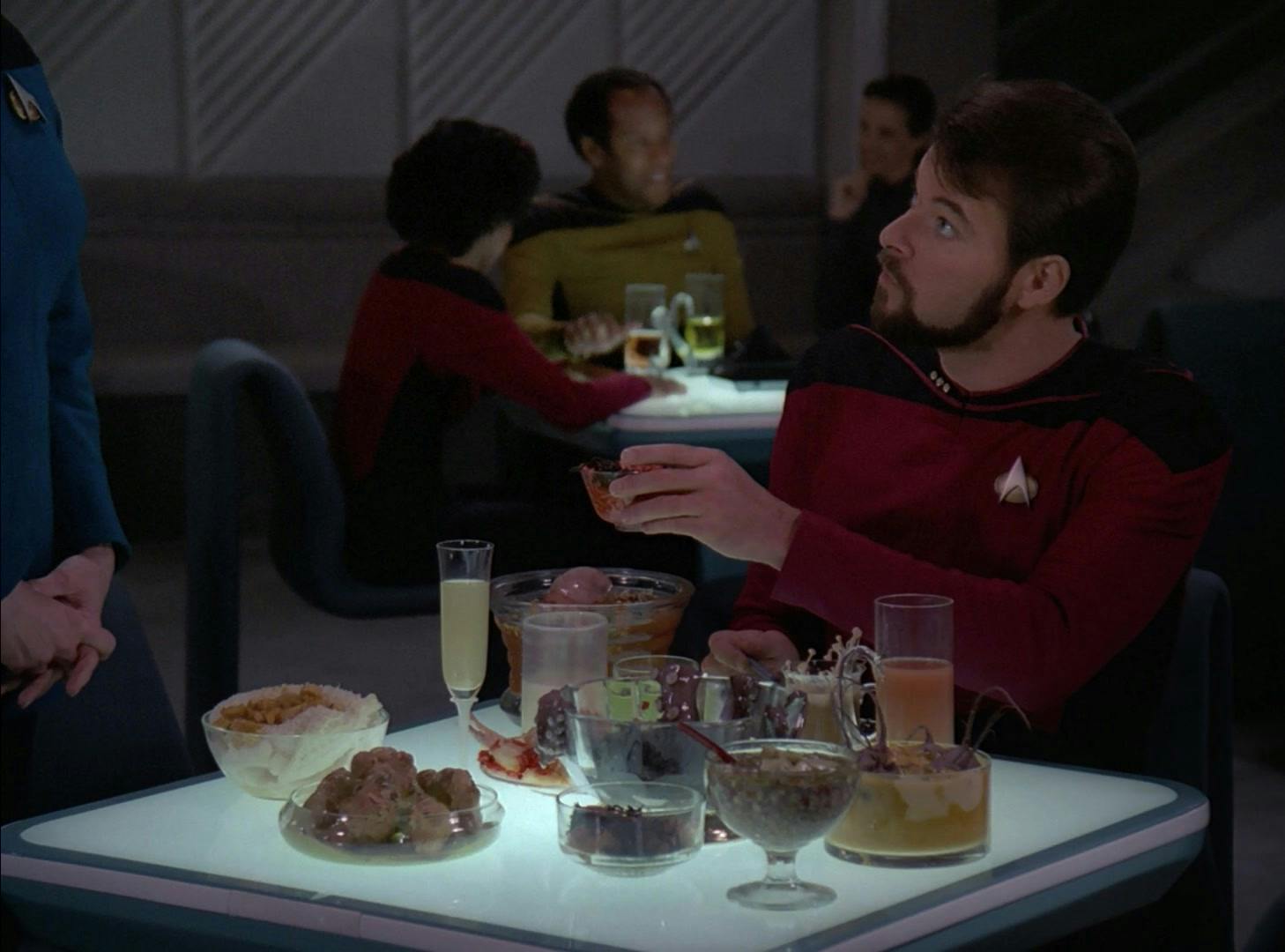
Riker enjoys a spread of Klingon delicacies in "A Matter of Honor"
StarTrek.com
Klingons are a boisterous race who have a history of xenophobia and violence. They're also bound to a strict warrior code and tradition, which indicated a potential reluctance towards introducing the comforts of technology into their daily lives. When we see them on screen, the only technological applications we see concern weaponry and conveyance to use that weaponry.
Other than the fact they have starships and disruptors, Klingons tend to be happiest in a feudal state. This extends to their ideas behind food. We usually see Klingons just before or after a fight, and their dining experience is generally centered around a major figure such as their commanding officer or chancellor, with much revelry and drunkenness. They prefer their food to be living when they begin to consume it, and thusly, replicator technology holds very little interest to them.
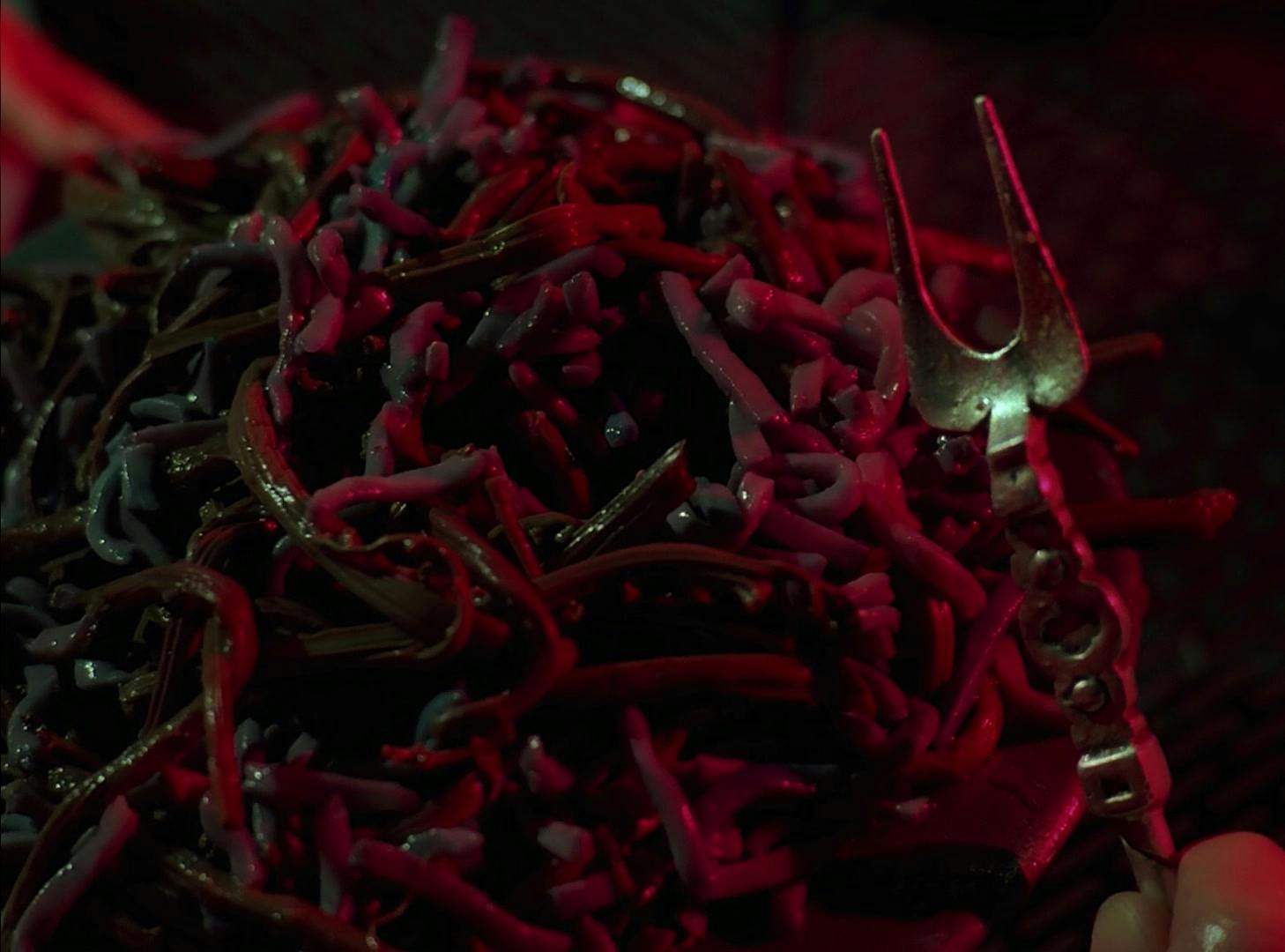
A serving of gagh aboard the Klingon ship in "A Matter of Honor"
StarTrek.com
In contrast, Federation officers comment on their diet rarely. Aside from eating from necessity, we've seen some who cook as a hobby, with Benjamin Sisko being the most notable. However, his father, who owns a restaurant in New Orleans, Louisiana on Earth is looked at as quite eccentric, even by his son. This suggests that the availability of any dish at any time via replicator has actually stifled the culinary traditions of Earth and perhaps the Federation at large.
Unlike the Klingons, members of the Federation don't seem to get overly excited about food or drink. Whenever we see a party or gathering, it's usually conducted as though everyone is attending a seminar at the local Ramada Inn. There's none of the drunkenness and revelry of a Klingon gathering. Instead, everyone stands around in neat groups until Geordi, Kira, or Tuvok pipes in over the com that something is going on, and then everyone disperses.
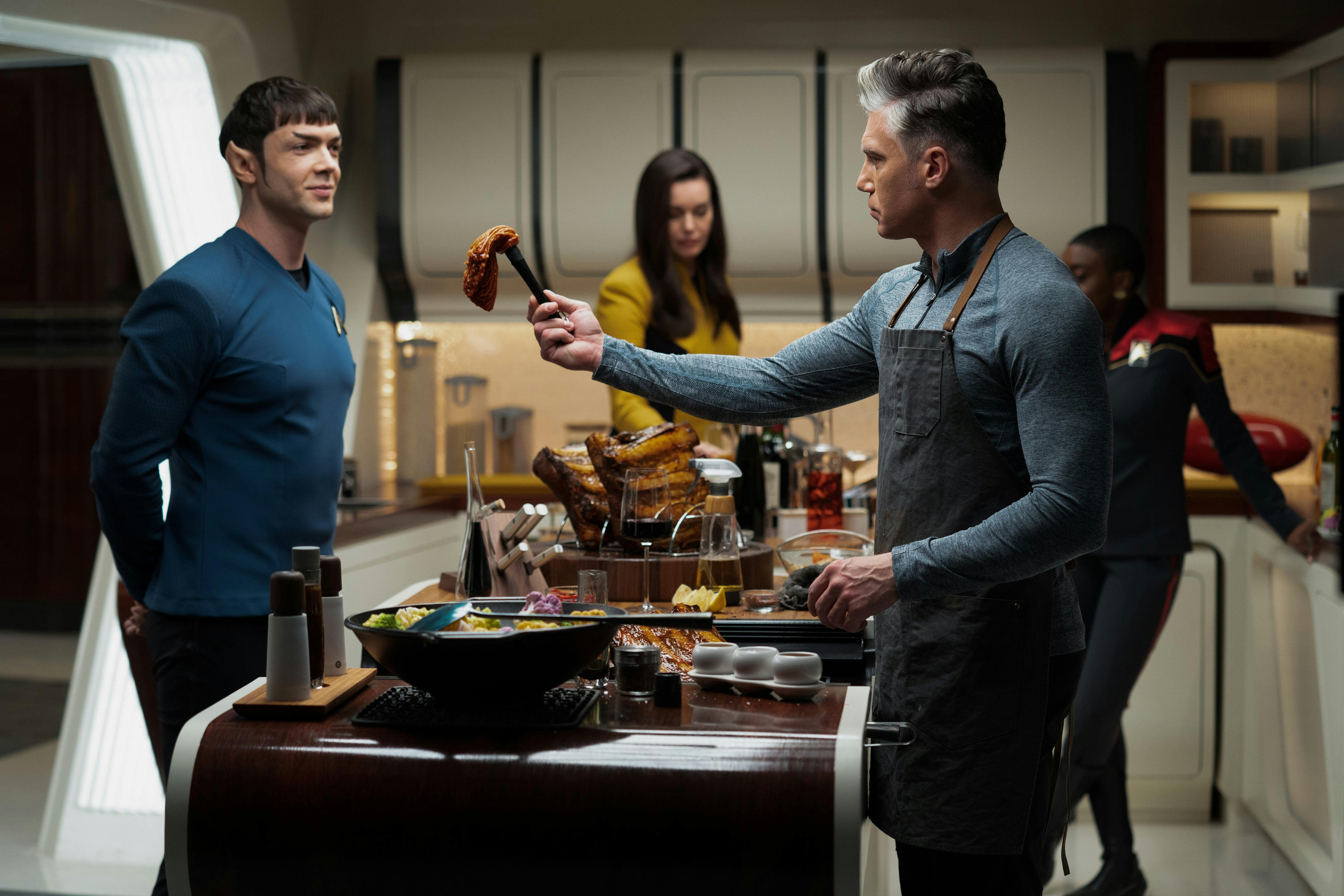
"Children of the Comet"
StarTrek.com
When someone on a Federation starship or installation cooks, it's usually treated as a big deal by those partaking. This makes it seem that the act of preparing a meal from raw ingredients (or even replicated ones) is more of a hobbyist thing. This is backed up by the fact that there's no "food of the future." In the West, 350 years ago, people were still mostly eating pottage, which was made just chucking whatever they had into a pot sitting above their fire and that was about the extent of the average person's cooking expertise.
The 19th Century saw the revolutionary inventions of refrigerators and canned goods, and throughout the 20th Century, food went in and out of vogue, so to speak. A plate of Taco Bell or McDonald's from today would be completely alien to someone who lived only a few centuries ago and even to someone from the early 1900s would likely be taken aback. Nuking a frozen dinner in the microwave would be a foreign concept to anyone who lived before World War II as well.
So, why don't we see any culinary cornerstones in the 24th Century? With all the myriad races that make up the Federation, it seems as though there should be some melting pot of the many edible traditions that combine to produce mind-blowing fusion dishes. But, there's just not.
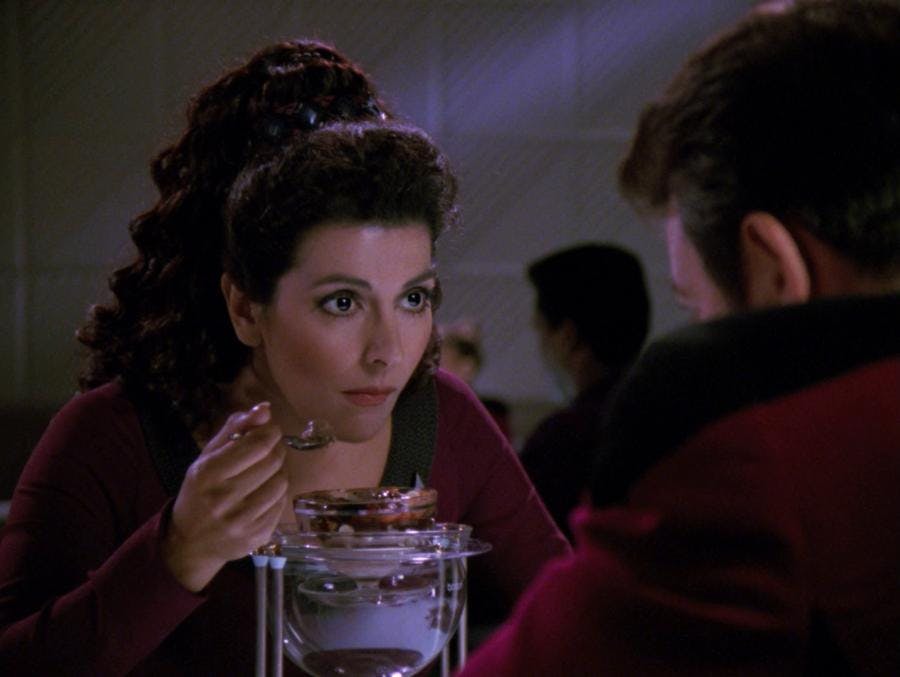
"The Game"
StarTrek.com
Have you ever had a house full of food and you're hungry, but you just kind of mope from the fridge, to the cabinet, bored with everything you have? Sometimes, the more food you have on hand the harder it is to get a craving to eat any particular dish. I think the Federation as a whole is suffering from this on a much, much larger scale.
Sure, Troi freaks out over chocolate every once in a while, but for the most part, the Federation characters we get to know have a small array of dishes they eat, and there's very little fanfare about it. So, when Jean-Luc Picard is ordering his multiple cups of Earl Grey everyday, it seems like he's saying, "this is fine," instead of, "I love Earl Grey tea."
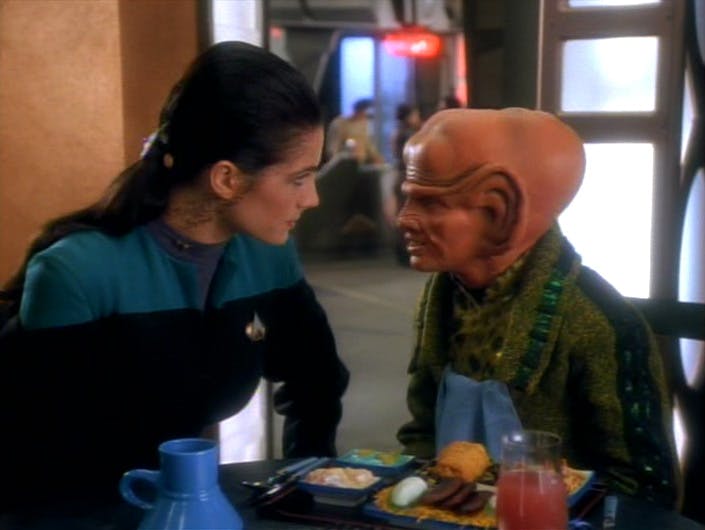
"Rules of Acquisition"
One might say that Starfleet has learned to cope with their perpetual culinary malaise by just ordering the same thing over and over; everyone wants a cup of Raktajino because it's good enough. Oddly, this might also be the reason we never see the issue of food addiction in Star Trek. No one is really all that interested in food anymore outside of their daily dietary requirement. It's possible that unlimited access to food has had the ironic effect of limiting Federation citizen's personal palate to a handful of dishes.
It might be that the Klingons love food because they continue to prepare it live instead of from a replicator. They're always excited to eat because they lack the massive amount of choice that Federation members do. If you're eating gagh six days a week, then bregit lung Tuesdays become something to look forward to. We can also assume that more prized consumables, like bloodwine, are held in reserve and doled out much like rum was on the ships of the 1700s and 1800s. If you do good in battle, part of your reward is likely the privilege to drink from the officer's reserve. With the Klingons, food is still seen as a prize, a status symbol, and an integral part of their culture.
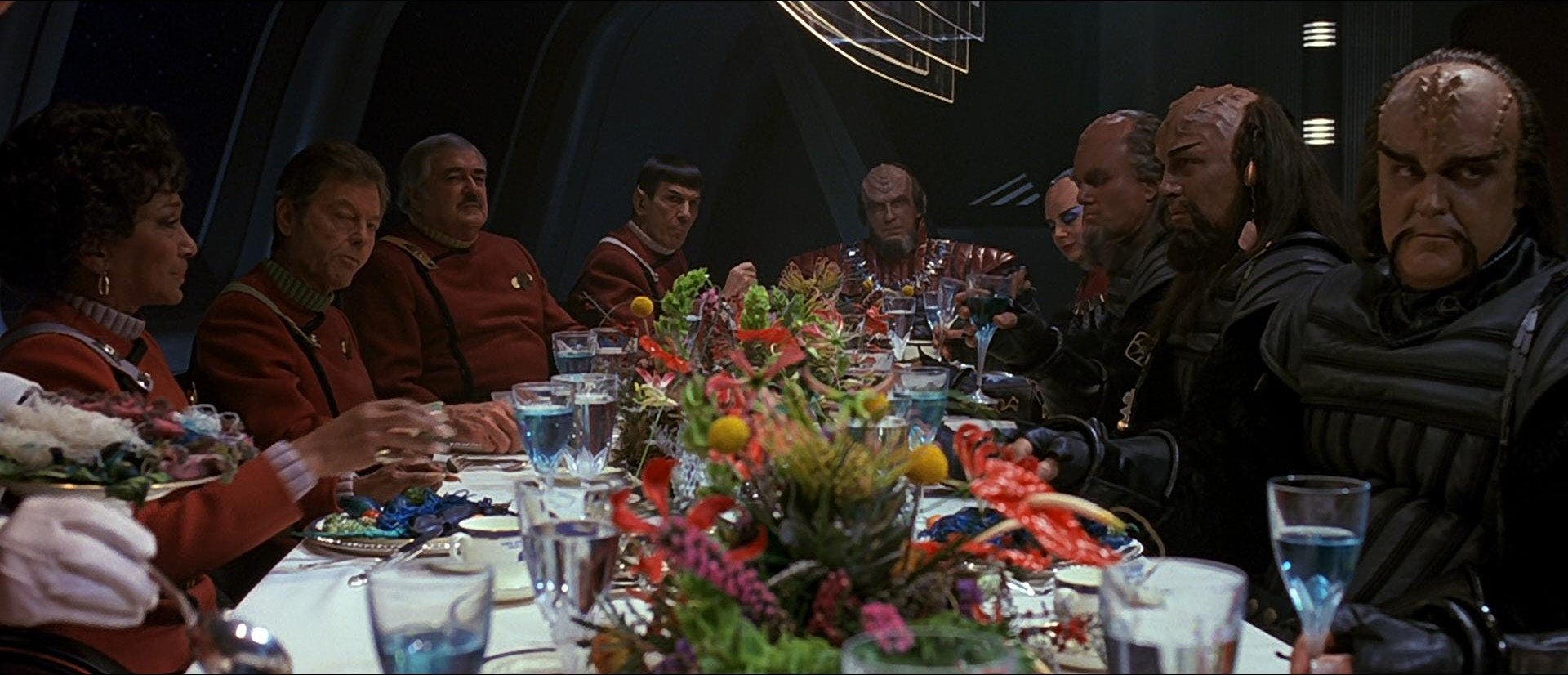
Star Trek VI: The Undiscovered Country
StarTrek.com
Of course, this all plays into our culinary beliefs today. There's a subconscious belief throughout almost every culture that the more civilized you are, the less you should have to deal with food preparation directly. In the United States, in particular, the average citizen is almost wholly divorced from the supply chain that brings meat, fruits, vegetables, grains, and dairy into their reach. It's enviable to eat at restaurants — the more expensive, the better — and when presented with ethnic cuisine, it's often considered a novelty.
What we know is that the Klingons, despite their outward aggression, have a rich history, and even in the 24th Century, continue to relish their culinary traditions. In contrast, the more "cultured" Federation only appears to have a shadow of the interest in cuisine we see on Earth today. Hopefully, we too can move towards a post-scarcity future, one where food is available to anyone who's hungry. However, I hope that we continue to celebrate and evolve the myriad schools of culinary arts that bring so much enjoyment and allow us to enjoy a different culture by just having a bite to eat.

